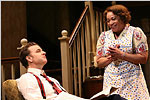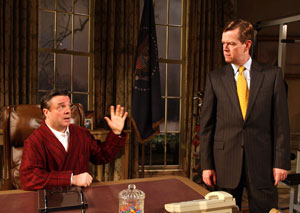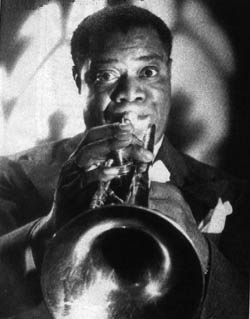Here’s my list of recommended Broadway and off-Broadway shows, updated weekly. In all cases, I gave these shows favorable reviews in The Wall Street Journal when they opened. For more information, click on the title.
Warning: Broadway shows marked with an asterisk were sold out, or nearly so, last week.
BROADWAY:
• Alfred Hitchcock’s The 39 Steps (comedy, G, suitable for bright children, closes Mar. 23, reviewed here)
• August: Osage County (drama, R, adult subject matter, closes Apr. 13, reviewed here)
• Avenue Q * (musical, R, adult subject matter and one show-stopping scene of puppet-on-puppet sex, reviewed here)
• A Chorus Line (musical, PG-13/R, adult subject matter, reviewed here)
 • Come Back, Little Sheba (drama, PG-13, adult subject matter, closes Mar. 16, reviewed here)
• Come Back, Little Sheba (drama, PG-13, adult subject matter, closes Mar. 16, reviewed here)
• The Farnsworth Invention (drama, PG-13, reviewed here)
• Grease (musical, PG-13, some sexual content, reviewed here)
• The Homecoming (drama, R, adult subject matter, closes Apr. 13, reviewed here)
• Is He Dead? (farce, G, reasonably family-friendly, reviewed here)
• The Little Mermaid * (musical, G, entirely suitable for children, reviewed here)
 • November (comedy, PG-13, profusely spattered with obscene language, here)
• November (comedy, PG-13, profusely spattered with obscene language, here)
• Rock ‘n’ Roll (drama, PG-13, way too complicated for kids, closes Mar. 9, reviewed here)
• The Seafarer (drama, PG-13, adult subject matter, reviewed here)
CLOSING SOON:
• The Fantasticks (musical, G, suitable for children old enough to enjoy a love story, closes Feb. 24, reviewed here)
• The New Jerusalem (drama, G, too complicated for children but accessible to mature adolescents, closes Feb. 20, reviewed here)
CLOSING NEXT WEEK:
• The Devil’s Disciple (drama, G/PG-13, not suitable for children, closes Feb. 10, reviewed here)
CLOSING SATURDAY:
• Happy Days (drama, PG-13, too complicated for kids, closes Feb. 2, reviewed here)

 In 1940 Jack Kapp, who ran Armstrong’s record label, unbent so far as to allow the trumpeter to cut a small-group date for Decca, his first of any significance since he had started recording with big bands in 1929. He did so in the stimulating company of Sidney Bechet, with whom he had made some of his best recordings of the Twenties. The session, which also featured Luis Russell and Zutty Singleton, was a deliberate attempt to evoke the old days. The tunes included “2:19 Blues,” a traditional New Orleans lament that Jelly Roll Morton recorded the same year, and “Coal Cart Blues,” a song by Armstrong himself in which he sang about selling coal on the streets of Storyville. It was touching to hear Armstrong and Bechet playing together for the first time in a decade and a half, but the results were musically uneven, and Bechet, for one, thought he knew why: “Louis, it seemed like he was wanting to make it a kind of thing where we were supposed to be bucking each other, competing instead of working together for that real feeling that would let the music come new and strong…it was like he was a little hungrier.”
In 1940 Jack Kapp, who ran Armstrong’s record label, unbent so far as to allow the trumpeter to cut a small-group date for Decca, his first of any significance since he had started recording with big bands in 1929. He did so in the stimulating company of Sidney Bechet, with whom he had made some of his best recordings of the Twenties. The session, which also featured Luis Russell and Zutty Singleton, was a deliberate attempt to evoke the old days. The tunes included “2:19 Blues,” a traditional New Orleans lament that Jelly Roll Morton recorded the same year, and “Coal Cart Blues,” a song by Armstrong himself in which he sang about selling coal on the streets of Storyville. It was touching to hear Armstrong and Bechet playing together for the first time in a decade and a half, but the results were musically uneven, and Bechet, for one, thought he knew why: “Louis, it seemed like he was wanting to make it a kind of thing where we were supposed to be bucking each other, competing instead of working together for that real feeling that would let the music come new and strong…it was like he was a little hungrier.” True or not, they were certainly better than the four new sides he had recorded with Bechet, an experiment that in any case would not be repeated. Armstrong may have longed in his heart to be playing small-group jazz, but he knew that the big money, at least for now, was in big bands. He had watched Joe Oliver hesitate over leaving Chicago for New York: “The agents and everybody…had wanted to bring him in someplace, any night club, with his band. But Joe wouldn’t leave. ‘I’m doing all right here, man,’ he’d tell them. He had good jobs with good tips. So time ran out on him. He looked around, and when he came to New York–too late.”
True or not, they were certainly better than the four new sides he had recorded with Bechet, an experiment that in any case would not be repeated. Armstrong may have longed in his heart to be playing small-group jazz, but he knew that the big money, at least for now, was in big bands. He had watched Joe Oliver hesitate over leaving Chicago for New York: “The agents and everybody…had wanted to bring him in someplace, any night club, with his band. But Joe wouldn’t leave. ‘I’m doing all right here, man,’ he’d tell them. He had good jobs with good tips. So time ran out on him. He looked around, and when he came to New York–too late.”